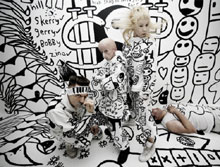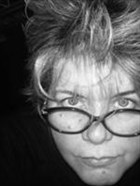
Top stories






LifestyleWhen to stop Googling and call the vet: Expert advice on pet allergies from dotsure.co.za
dotsure.co.za 16 Feb 2026
More news


Marketing & Media
Ads are coming to AI. Does that really have to be such a bad thing?














It was the zef trio's appearance on BoingBoing that proved the tipping point by driving millions of visitors to their website and crashing their server. Since then the home grown rappers signed with William Morris Endeavour (the same agents who handle 50c, Akon, Eminem, Snoop Dogg and Rihanna); and became the first South African act to debut at Coachella. A California music and arts festival, Coachella has seen performances by the likes of Nine Inch Nails, Coldplay, Depeche Mode, Red Hot Chili Peppers, The Cure, The Killers, and Gorillaz.
The media love Die Antwoord because they're an online traffic churning phenomenon. The group is regularly featured in internationals like of Reuters and the UK's Telegraph. The trio now has over 63 000 fans on Facebook (and counting). By the looks of things they won't be flying economy any time soon.
With a viral magic that should make any local music marketer green, Die Antwoord have become the kings of the interweb. But how, oh how did they do it?
MandyLives!com editor Mandy de Waal speaks to local youth and cultural expert Andrew Miller about the zef crew. Miller first met Watkin Tudor Jones (aka Waddy or Ninja) - the brains behind Die Antwoord in the early 2000s. An author and stand up poet, Miller works with inner city creatives, rap artists and poets. He often writes and speaks on youth culture for the local marketing community.
Mandy de Waal: What's your take on Die Antwoord - where did they come from?
Andrew Miller: I think they / he are fascinating. They came straight out of Waddy's weird head.
MdW: How did they become part of our national fabric so quickly?
AM: The production is slick in every sense which appeals enormously to media creatives - people who have a finger stuck to the mouse and who have access to bandwidth. I was sent the link to their site every day for weeks, generally by advertising and media people. The whole thing is a South African viral phenomenon.
MdW: What caused the viral land grab?
AM: Sometimes all the winds just blow in the right direction and magic happens. And sometimes people need an antidote to the ShoutSA type of nation positive, feel-good media garbage that's around, which, while well intentioned, rings true only in mythical TV land. Many people who actually live in South Africa welcome creative material which seems to speak to street / daily life.
MdW: They're huge internationally? How do you pull that off?
AM: Waddy (Ninja) didn't just come out of nowhere. He's a well established artist with a lot of connections and Die Antwoord is a slick product. All they had to do was Sprinkle the magic powder and step back.
MdW: Is Die Antwoord hype or is it a genuine phenomenon with staying power?
AM: I reckon there's a fair chance the whole thing will evolve and grow, musically and trend wise. But with this much hype it's difficult to say. Not many artists on the global scene really hold the spotlight over a sustained period. Ultimately I'm not sure this type of thing will ever line up against the Black Eyed Peas et al. In many senses these types of comparisons are spurious anyway. For me if the music evolves beyond smoking zol anything is possible, but at the moment we're firmly in hype / novelty country.
MdW: Who is Watkin Tudor Jones aka Ninja?
AM: He appears to be someone - originally - just like me. In other words, a white boy from the suburbs. I interviewed him many years ago as Max Normal (his original incarnation) was taking off. I was struck by a story he told about signing to a label as a youngster, then quitting the deal because they were trying to turn him into a pop snack. He had to sit out of the business for something like two years I think. No recording, no performing - his contract wouldn't allow it. I remember being impressed at the time - not many young people would be willing to step back from a big bite at the celebrity cherry.
MdW: What is 'Zef Culture'?
AM: If you're a 'Seffrican' you know it instinctively. If you're not you're probably thinking these people are cooked. It's about zol and bokkiies, it is street life with a working class Afrikaner / Coloured orientation. Trainspotting goes to Belville and the Cape Flats.
MdW: Can you deconstruct "Die Antwoord"?
AM: No man. What's the point? It is performance art and it dissolves in your hands if you think about it too much. Enjoy it, don't deconstruct it. Get all academic on it and get egg on your face.
MdW: Does Waddy have credibility in?
AM: I think so. Especially with long time creatives and entertainment pros. I'm sure he gets solid enough nods from his fellows as they go round the block.
MdW: What does the Jozi hip hop and rapper community think of the "Ninja" and his crew?
AM: The hip hop people I've spoken to seem to view him and Die Antwoord as a clever pastiche and / or performance art, but few on the hip hop scene really consider it to fit within the genre at all. It's a skit, more than anything else. There's respect for the whole gig and a lot of laughter - as there should be. But this isn't conscious hip hop or anything - I'm not sure too many heads are giving it that much thought.
MdW: How much of Die Antwoord is marketing? How much is genius? How much is talent?
AM: Marketing: 25%. Genius: 10%. Talent: 25%. Weird unknowable forces: 40%.
MdW: How does Die Antwoord speak to the current culture of voyeurism, celebrity and reality?
AM: It offers a great, safe lens into ghetto culture for suburban kids and ad agency people - those who love to play conceptually with such things but who would wet their pants if they ever actually ended up in the ghetto. It is a cultural two minute noodles really - great for the couch-bound cultural explorer who likes to pay R100 to see a band. Perfect for the end of the first decade of the 21st century - we're all voyeurs now.
MdW: What marketing and social media lessons can other artists learn from Die Antwoord?
AM:Be original. Whatever you do will bomb if it's not your thing. Those who copy others just look weaker and weaker... Die Antwoord works because it's its original.
MdW: Waddy is quoted as saying that Die Antwoord was five years in the making. Has he used that time well?
AM: Sure, but who really knows about this stuff? It's all PR. Maybe 4.5 of those years were spent puffing blunts on the couch and putting on weird accents for the hell of it. We will never know. Never believe anything you read.
MdW: Does Waddy represent South African culture "all these different things, all these different people fucked into one person?"
AM: In a sense, but only a few of the many. Die Antwoord is definitively South African but it only captures a small slice of our crazy pie. As a people, as a nation, we're far, far weirder than Die Antwoord can even think of.
